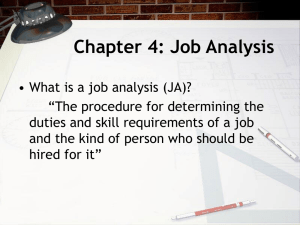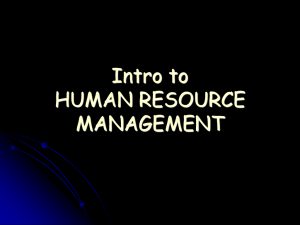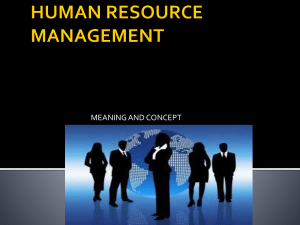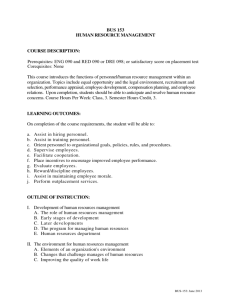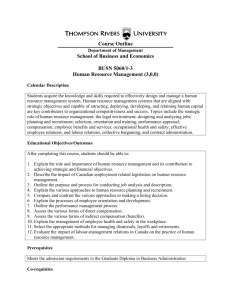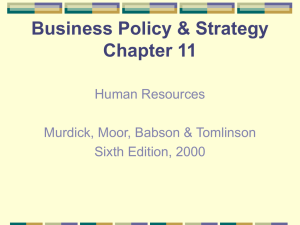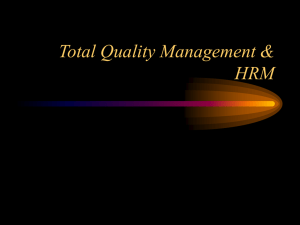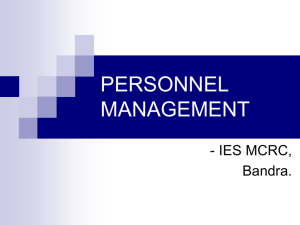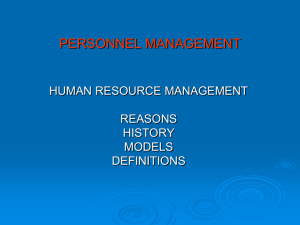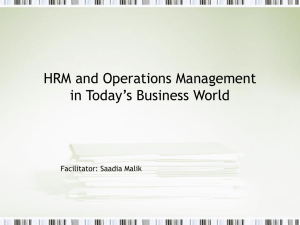first lecture . Int,l Bus
advertisement
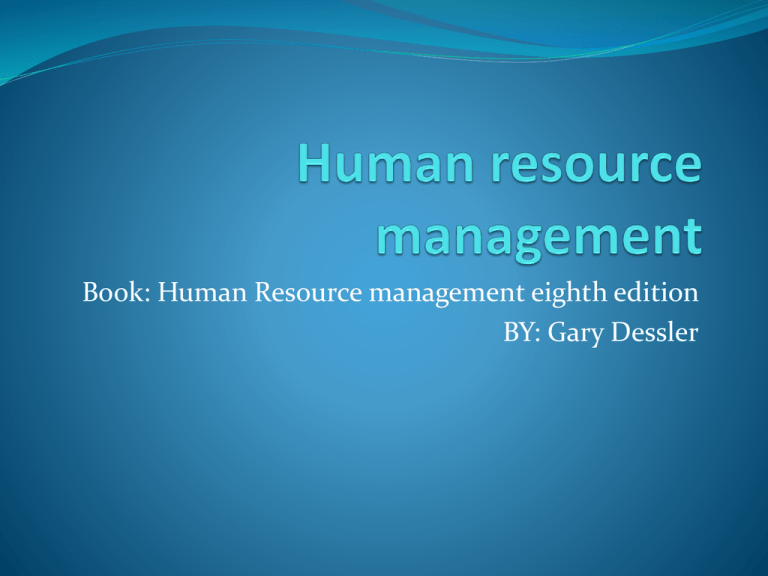
Book: Human Resource management eighth edition BY: Gary Dessler Management process Planning Organizing Staffing Leading controlling Human Resource Management The policies and practices one need to carry out the people or human resources aspect of a management position including Recruiting Screening Training Rewarding Appraising HRM practices and policies Manager need to carry out Conducting job analysis(determining the nature of each employees job) Planning labour needs recruiting job candidate Selecting job candidate, orienting and training Managing wages and salaries Providing incentive and benefits Appraising performance Communicating(interviewing, counselling, discipline) Training and development Building employment commitment Manager should know about Equal opportunity and affirmative action Employee health and safety Grievances and labour relations Why is HRM important to all managers Hire the wrong person for the job Experience high turn over Find your people not doing best Waste time with useless interviews Have your company taken to court because of your discriminatory action Have your company cited under federal occupational safety laws for unsafe practices Have some of your employees think underpaid Allow lack of training Commit any unfair labour practices Line Versus staff authority Authority: The right to make decisions, direct others, work, and give order Line manager: A manager who is authorized to direct the work of subordinate and the responsibility for accomplishing the organization’s goal Staff manager: A manager who assists and advises the mangers Line managers’ Human Resource Management responsibilities 1. 2. 3. 4. 5. Placing the right person on right job Starting new employees in the organization Training employees for the job that are new to them Improving the job performance of each person Gaining creative cooperation and developing smooth working relationship Line managers’ Human Resource Management responsibilities 6.Interpreting company’s policies and procedure 7.Controlling labour cost 8.Developing the abilities of each person 9.Creating and maintain department morale 10.Protecting employees health and physical condition HR department’s HR management responsibilities HR department provide specialize assistance to carry out three distinct function 1. Line function 2. Coordinating function 3. Staff(service function) Line function HR manger perform line function by creating the activities of the people in his or her own department and in services area Ensure 1.HR objective 2. Policies 3. Procedure Coordinating function personnel activities Coordinating function HR manager function as coordinator of personnel activities, a duty refer to as functional control Act as right arm of the top executive to ensure that HR objective, policies, and procedure that have been approved and adopted are being consistently carried out by line manager Hiring Firing of employees Training Staff function(services) Evaluatio n Promotion Rewarding Employees advocacy HR must take responsibility for clearly defining how manager should 1. Treat employees 2. Make sure employees have the mechanism required to contest unfair practices 3. Represent the interest of employees within the frame work of its primary objective to senior management Changing environment of human resource management Globalization Technological advancement Deregulations Trends in the nature of work Workforce diversity Legal trends affecting human resource management(equal employment opportunity law bar discrimination on the basis of race, age, disability, religion, sex, or national origins) New management practices Employees are being empowered Flatter organization becoming the norms Work is increasingly organize around the teams and process rather than specialized function The basis of power are changing Manager today must build commitment Changing role of HR management People and performance: 1. Early 1900s personnel people first took over hiring and firing from supervisor, ran payroll department, administered benefit plan 2. 1930 led to second phase, protecting the firm in its interaction with union 3. Discrimination legislation 1960s and 1970s triggered third phase 5.Personnel is speeding in forth phase and role is shifting from protector and screening to strategic partner and change agent 6.Now flattened, downsized, high performing organization, highly trained and committed employees are firm competitive advantages HR and employees commitment Employees identification with and agreement to pursue the company’s or the unit mission Two way communication foster commitment Fair treatment of all employees grievances and disciplinary action HR and performance Personnel screening test to select high potential employees that can save million of dollars Train first line manager to lowering labour cost HR helps employees to prioritize task and reduce task HR and service Employees behaviour is important for in the firm performance Tactless, unprepared to discuss pros and cons of different product Services industries very much dependent on employees behaviour HR plays crucial role in shaping employees behaviour through : employees career progress, provide orientation/ socialization programs for employees improvement HR and responsiveness HR help to make companies better, faster more competitive through Downsizing flattening the pyramid Empowering employees Organizing around the teams Improving communication Flexible working hour Strategic Human Resource Management Employees today’s competitive advantages has led to the growth of the new field known as strategic human resource management The linkage of HRM with strategic goal and objective in order to improve business performance and develop organization culture that foster innovation and flexibility Plan of study Recruitment and placement Training and development Compensation Employment security and safety International HRM Recruitment and placement Job analysis The procedure for determining the duties and skill requirement of job and the kind of person who should be hire for that Job description: A list of job duties, responsibilities, reporting relationship, working condition, and supervisory responsibilities Job specification A list of job’s “human requirements” that the requisite education, skill, personalities, and so on. Use of job analysis information 1.Recruitment and selection I. What job entail II. What characteristic required to carry out these activities III. What sort of people to recruit and hire 2. compensation Estimating the values of and appropriate compensation for each job II. Compensation depend upon things like job’s required skill, education level, safety hazards degree of responsibility III. Each job can be classified accurately I. 3.Performance Performance appraisal compares each employees with his her performance standard Through Job analysis experts determine the standard to be achieved and specific activities to be performed Training Designing training Development program Ensure complete assignments of duties Job analysis helps to discover unassigned duties Steps in job analysis Step 1: I. Identify the use to which the information will be put II. This help to determine the data you will collect and how to collect III. Selection of data collection technique to get information what job entails(qualitative or quantitative) Step 2: I. Review relevant background information like organization chart, process chart and job description. II. Chart should be indentify the title of each job III. The means of interconnecting lines, who report to whom and with whom the job incumbent is expected to communicate IV. Process chart provide more detail picture of work flow than obtainable from the organizational chart alone Step 3: Select representative position to be analyse Step 4: I. Analyse job by collecting data on job activities II. Required employees behaviour III. Working condition IV. Human traits and ability needed to perform job I. Step 5: Review the information with job incumbent II. Information should be verified with worker performing job III. This helps to confirm that information is factually correct and complete IV. This helps to gain employees acceptance of the job analysis data I. Step 6 I. Develop job description and job specification
